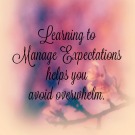I don’t know about you, but 2020 was a rollercoaster. Mentally, physically, and emotionally, I often felt drained and overwhelmed. By year’s end, certain things settled down, while others remained uncertain. And that led me to reflect on what I did to try to stay productive during challenging times.
As humans, we will always face challenges. During these times, we can learn more about ourselves and the power we have over what we think and do. Three effective ways we can stay productive as our world and workplaces change are through:
- Energy Management
- Our Sphere of Influence
- Embracing Impermanence
Preserve and Manage Energy Wisely
Protecting our energy is more important than ever when we face uncertainty and radical change. Productivity and concentration can slip as our brains try to manage the thoughts and emotions that come from feeling insecure in a new and confusing world. By remembering that we have the power to influence our energy, we can develop new rituals and habits that help us stay sharp and focused.
Limiting time on electronic devices, being discerning about the news we consume, and developing effective sleep rituals are three ways to preserve and manage our energy. The central nervous system needs a break, and it can’t take one if newsfeeds regularly bombard it. Sleep helps our body regulate stress hormones and is critical when it comes to how well we can focus and therefore stay productive. As a reminder, during challenging times, we may need to adjust our energy expectations to what is optimum, not what is perfect. We should certainly not expect ourselves to be quite as productive as we have been in the past.
One of the most important ways we can show compassion and kindness to ourselves is to take breaks. Our usual productivity levels may be in flux, and during this time, it’s crucial not to become overwhelmed. Scheduled and timed breaks allow our brains time to reset and rest, even if only for a few minutes. Downtime is as important as work time when it comes to mental and emotional health.
Focus on What You Can Control
Our feelings around productivity revolve around what is known as our Sphere of Control (or Sphere of Influence). We may not have the ability to control the weather, stoplights, other people’s opinions, or the color of our eyes, but there are many things that we can control, and those are the things we need to focus on. It is always in our best interest – physically, mentally, and emotionally – to focus on what we can control and practice letting go of the things we can’t.
During times of challenge, we often feel like more and more things are beyond our sphere of control, but I’d encourage you to reexamine that belief. Make a list of what you can control, and you may be surprised. Take note of where you’re spending your energy; are you using it on things within your sphere, or are you exhausting yourself by paying attention to or focusing on something you can’t influence? This exercise can help you stay focused and lead to feelings of satisfaction and fulfillment vs. feelings of helplessness and overwhelm.
Embrace Impermanence
While certain things have changed forever changed in our world, one of the things we must remember is that there is a great deal of impermanence around us. And while some of this impermanence is the cause of our stress and anxiety, we must remember that our ability to discern what is and is not permanent is powerful.
We will know more about how we will work and live in one month than we do now. We will learn how to change and adapt – as humans have over millennia – each and every day if we embrace change with a different attitude. One thing that radical change often does is ask us to look for silver linings and be grateful for small things. Things we have taken for granted are often the first things we are grateful for; what small things are you grateful for today that you wouldn’t have noticed a year ago?
Difficulty and change ask us to reflect on how we have transformed as individuals (and often as part of groups) and how we have evolved our ways of being productive. Our daily routines may look completely different, but how have we managed to do what is most important? What new beliefs and habits now shape our lives, often for the better? By embracing impermanence, we permit ourselves to try new ways of living and working and, in the process, discover new ways to be productive.
Humanity will continue to face challenges and triumph in the face of adversity. By managing your energy, focusing on what you can control, and embracing impermanence, you can learn to shift your perspective and better manage the ups and downs that come with the radical changes that impact every individual and our society. With gratitude, I ask you to find the grace in small things and carry on in ways that supports both you and our greater world.






